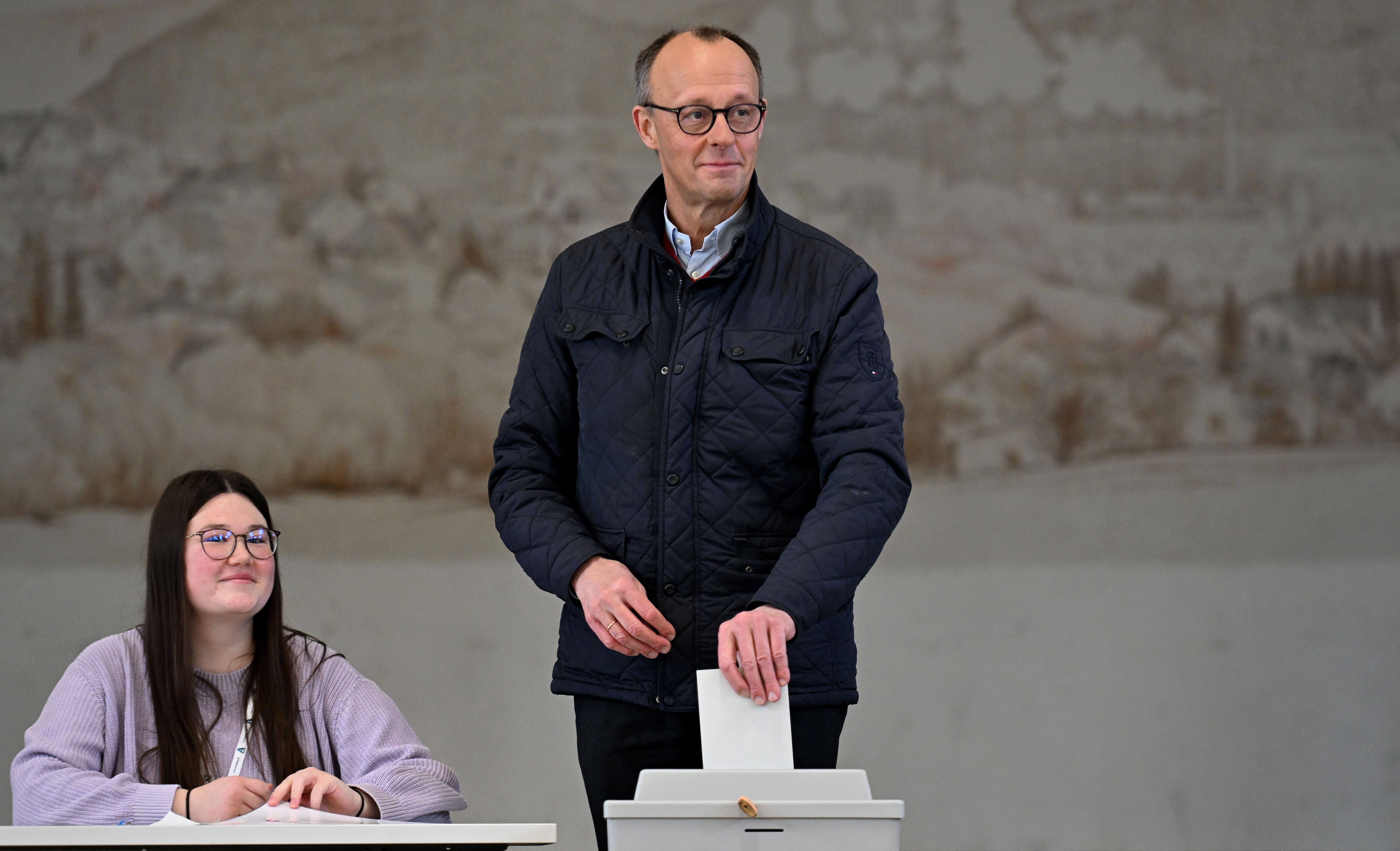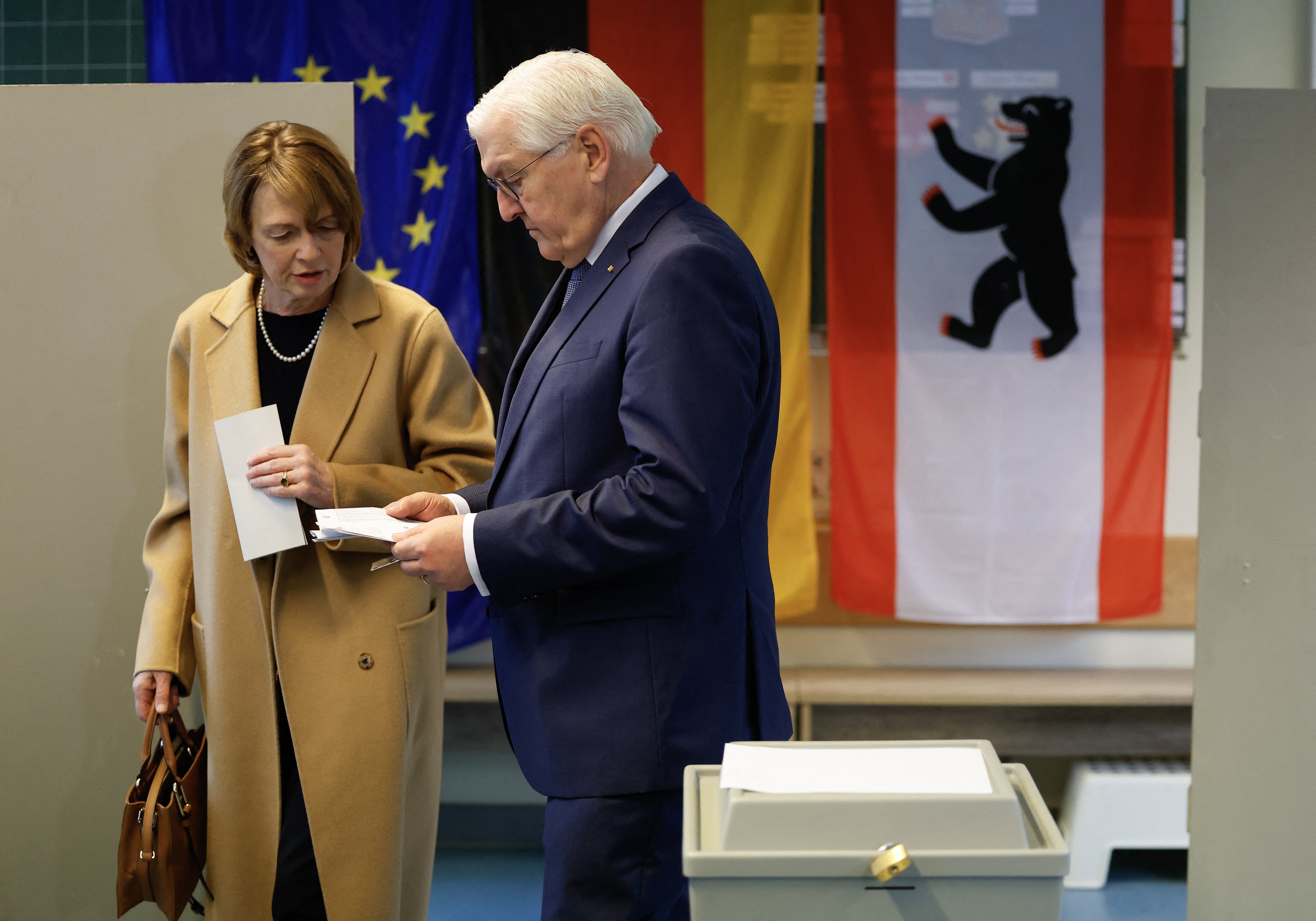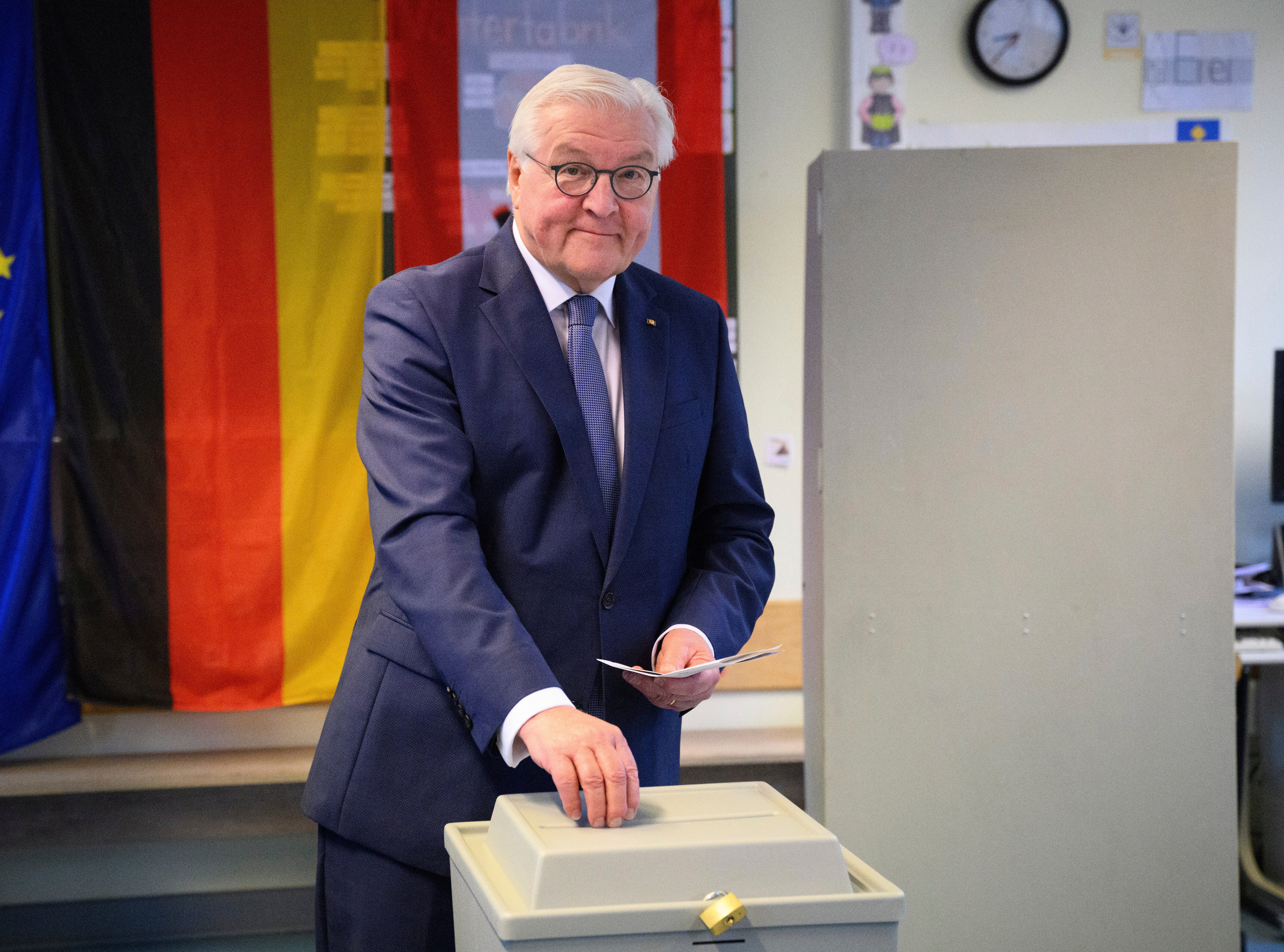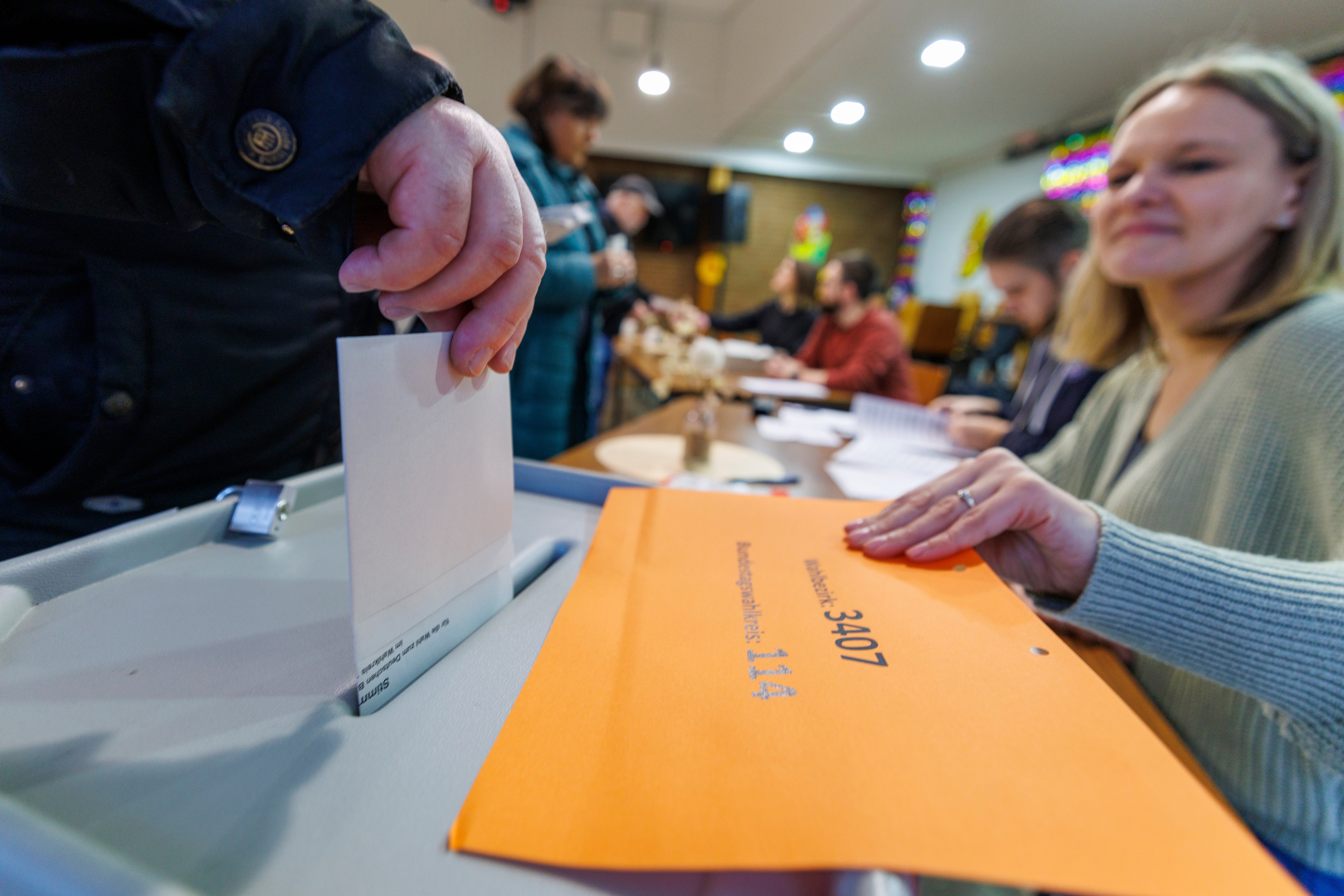Your support helps us to tell the story
From reproductive rights to climate change to Big Tech, The Independent is on the ground when the story is developing. Whether it’s investigating the financials of Elon Musk’s pro-Trump PAC or producing our latest documentary, ‘The A Word’, which shines a light on the American women fighting for reproductive rights, we know how important it is to parse out the facts from the messaging.
At such a critical moment in US history, we need reporters on the ground. Your donation allows us to keep sending journalists to speak to both sides of the story.
The Independent is trusted by Americans across the entire political spectrum. And unlike many other quality news outlets, we choose not to lock Americans out of our reporting and analysis with paywalls. We believe quality journalism should be available to everyone, paid for by those who can afford it.
Your support makes all the difference.
Voters are heading to the polls in Germany, in an election which is being closely watched across Europe and in the United States.
Polling stations opened their doors at 8am local time (7am UK), with exit polls released and counting set to begin as soon as voting closes at 6pm (5pm UK).
The outcome, which will determine how the country is run for the next four years, is expected to be clear fairly quickly, but the final official result is expected early on Monday.
The centre-right Christian Democrats (CDU/CSU) is hoping to become the largest party in the Bundestag, allowing them to reinstall their first chancellor since Angela Merkel stepped down in 2021.
The far-right AfD is also hoping to make gains, after an election campaign heavily focused on immigration and the economy.
German president Frank-Walter Steinmeier called the elections after chancellor Olaf Scholz lost a vote of confidence on 15 January – after losing the support of his coalition when he fired finance minister Christian Lindner amid tensions over economic policy.
But the governing coalition had been falling in popularity long before the dispute within government, with the AfD having surged in federal elections in Thuringia and Saxony last September.
‘That’s how a mini-Trump speaks’: SPD hit out at frontrunner Merz
The incumbent SPD party has hit out at remarks made by frontrunner Friedrich Merz in his campaign finale yesterday, in which the CDU-CSU candidate claimed: “The left is over. There is no longer a left-wing majority and no more left-wing politics in Germany. It’s over. It’s no longer possible.”
According to Der Spiegel, SPD general secretary Matthias Miersch has now responded by saying: “That’s how a mini-Trump speaks.”
Andy Gregory23 February 2025 14:19
How quickly will a governing coalition be formed?
There is no formal referee for the process of forming a new government, and no set time limit.
Conservative leader and front-runner Friedrich Merz has said he hopes to form a new government by mid-April if he wins.
Chancellor Olaf Scholz’s outgoing government will remain in office on a caretaker basis until the Bundestag elects the new chancellor.
Andy Gregory23 February 2025 13:11
Some states report higher interim voter turnout compared with 2021 election
While a federal interim figure on voter turnout is not expected until later this afternoon, some states have now published some early statistics which are being reported by German news outlets.
As of midday in Saxony, 27.1 percent of those eligible to vote had cast ballots, compared with 25.8 per cent at the same time in the previous 2021 election.
In Lower Saxony, that figure was 43 percent, compared with 36.6 percent in 2021.
There was an even more dramatic increase in Saxony-Anhalt, where 37.1 per cent of those eligible had voted by midday, compared with 26.5 per cent at the same time in 2021.
However, in the northermost state of Schleswig-Holstein, as of 11am, 21.3 percent of eligible voters had cast their ballots, which was down slightly from 23.8 per cent in 2021.
Andy Gregory23 February 2025 12:51
Bayern great Uli Hoeness speaks out against far right
Bayern Munich powerbroker Uli Hoeness has said he would speak with any of the football club’s players who support the far-right Alternative for Germany (AfD) party.
Mr Hoeness, who is Bayern’s honorary president after more than 40 years at the forefront of the club, told Kicker magazine that he would question any AfD-supporting player “and ask him if he still has all his tools in his toolbox”.
He added: “Bayern is a wonderful role model for migration and integration. More than half of our youth players have a migration background.”
Andy Gregory23 February 2025 12:01
Scholz and Merz cast their votes
Germany’s chancellor Olaf Scholz has now cast his vote, visiting a polling station in Potsdam alongside his wife Britta Ernst.
The CDU/CSU’s candidate for chancellor, Friedrich Merz, has also cast his ballot at a polling station in Arnsberg.

Andy Gregory23 February 2025 10:52
What are Germans voting for?
More than 59 million people in the nation of 84 million are eligible to elect the 630 members of the lower house of parliament, the Bundestag, who will take their seats under the glass dome of Berlin’s landmark Reichstag building.
Germany’s electoral system rarely produces absolute majorities, and no party looks anywhere near one this time. It’s expected that two or more parties will form a coalition, following potentially difficult negotiations that will take weeks or even months before the Bundestag elects the next chancellor.
This election is taking place seven months before it was originally planned, after centre-left chancellor Olaf Scholz’s coalition collapsed in November, three years into a term that was increasingly marred by infighting.
Andy Gregory23 February 2025 10:36
Germany’s president Frank-Walter Steinmeier has urged others to exercise their right to vote as he cast his own ballot on Sunday morning.
“Use your right to vote, go and vote, help determine the future of our country and vote in the knowledge that your vote could be the decisive one,” Mr Steinmeier was quoted in local media as saying at a school in Berlin-Zehlendorf.

Andy Gregory23 February 2025 10:01
German president casts his vote
German president Frank-Walter Steinmeier has cast his vote at a polling station in Berlin.
Steinmeier called the elections after chancellor Olaf Scholz lost a vote of confidence in the German Bundestag on 15 January – after losing the support of his coalition when he fired finance minister Christian Lindner amid tensions over economic policy.

Amy-Clare Martin23 February 2025 09:15
When will we find out the result?
Exit polls will be announced and vote counting will begin as soon as soon as polls close at 6pm local time (5pm UK).
The general picture is expected to become clear fairly quickly, but the final official result is not expected until early on Monday.
Germany’s electoral system rarely gives any party an absolute majority and it is expected that two or more parties will most likely form a coalition.
There is no set time limit for this process, with parties likely to hold exploratory talks to determine who they have most common ground with before moving on to formal coalition talks.
Those negotiations typically produce a detailed coalition agreement setting out the new government’s plans. That will typically need approval at least from conventions of the parties involved and some parties may choose to put it to a ballot of their entire membership.
Once that process is complete, the Bundestag can elect the new chancellor.
Amy-Clare Martin23 February 2025 08:55
German voters head to the polls
German voters are heading to the polls to elect a new parliament which will determine how the country is run for the next four years.
Polls opened at 8am local time (7am UK), with exit polls released and counting set to begin as soon as voting closes at 6pm (5pm UK).
Germans can also vote by postal ballot, but their ballot must arrive by the time polling stations close on election day to be counted.

Amy-Clare Martin23 February 2025 08:35


